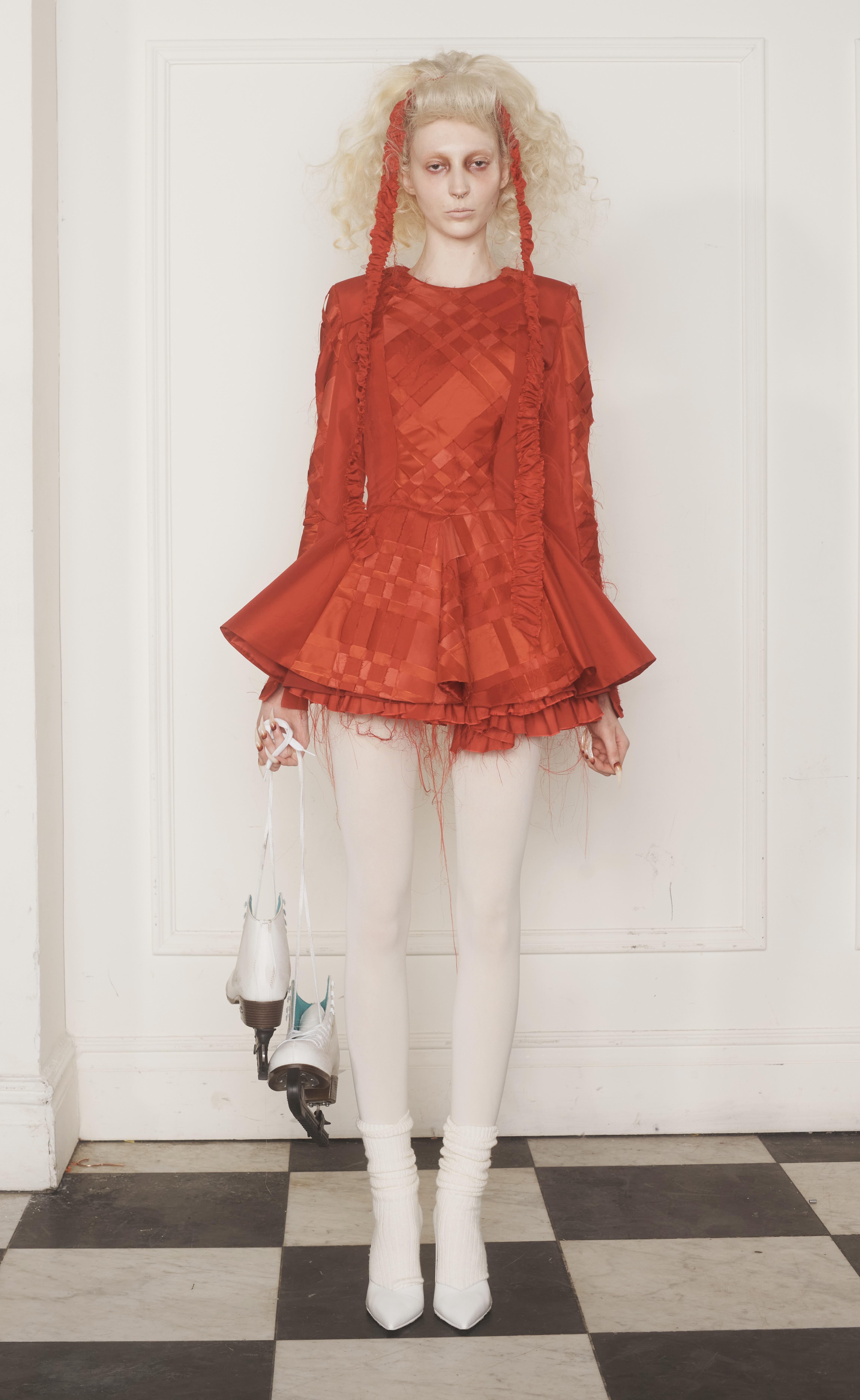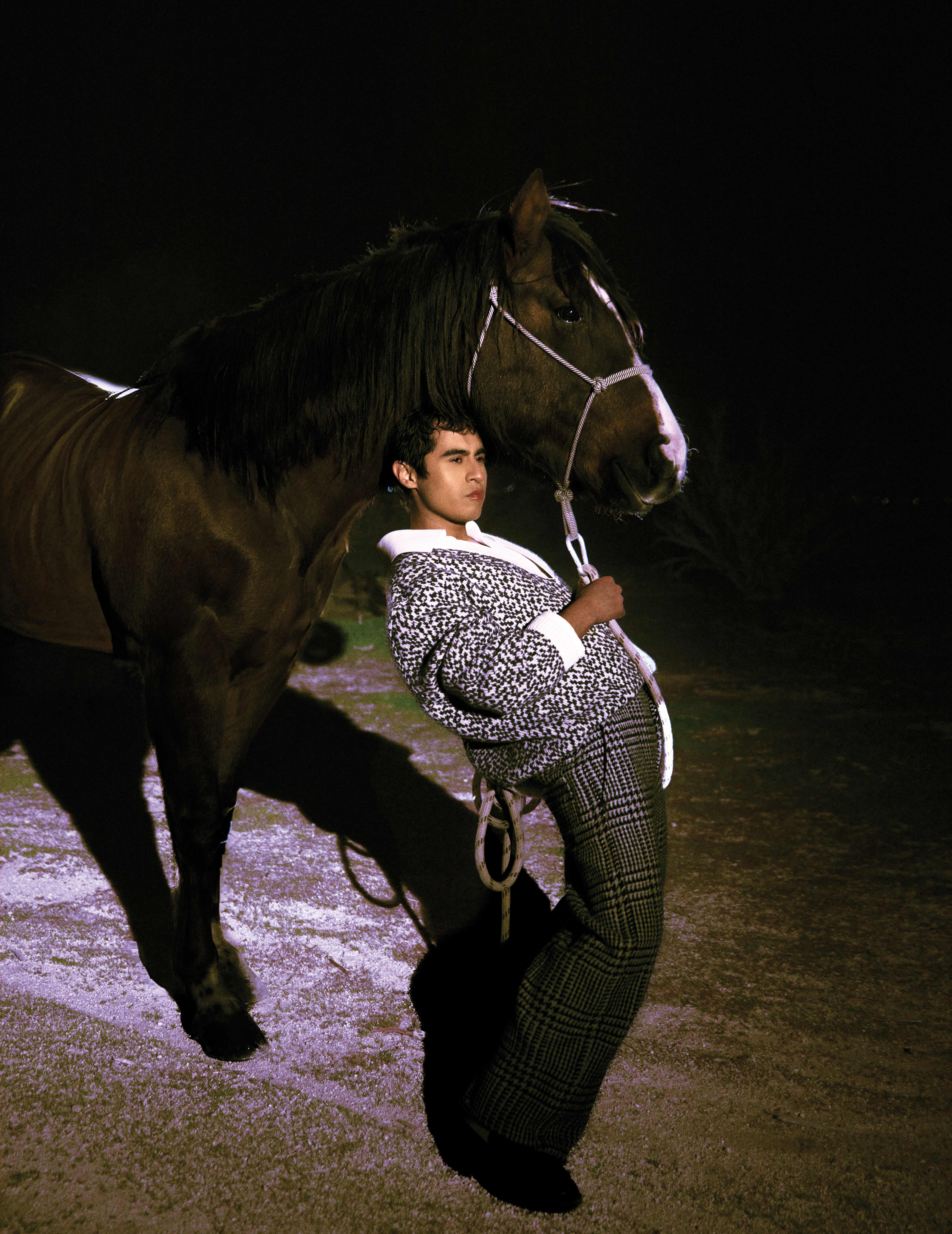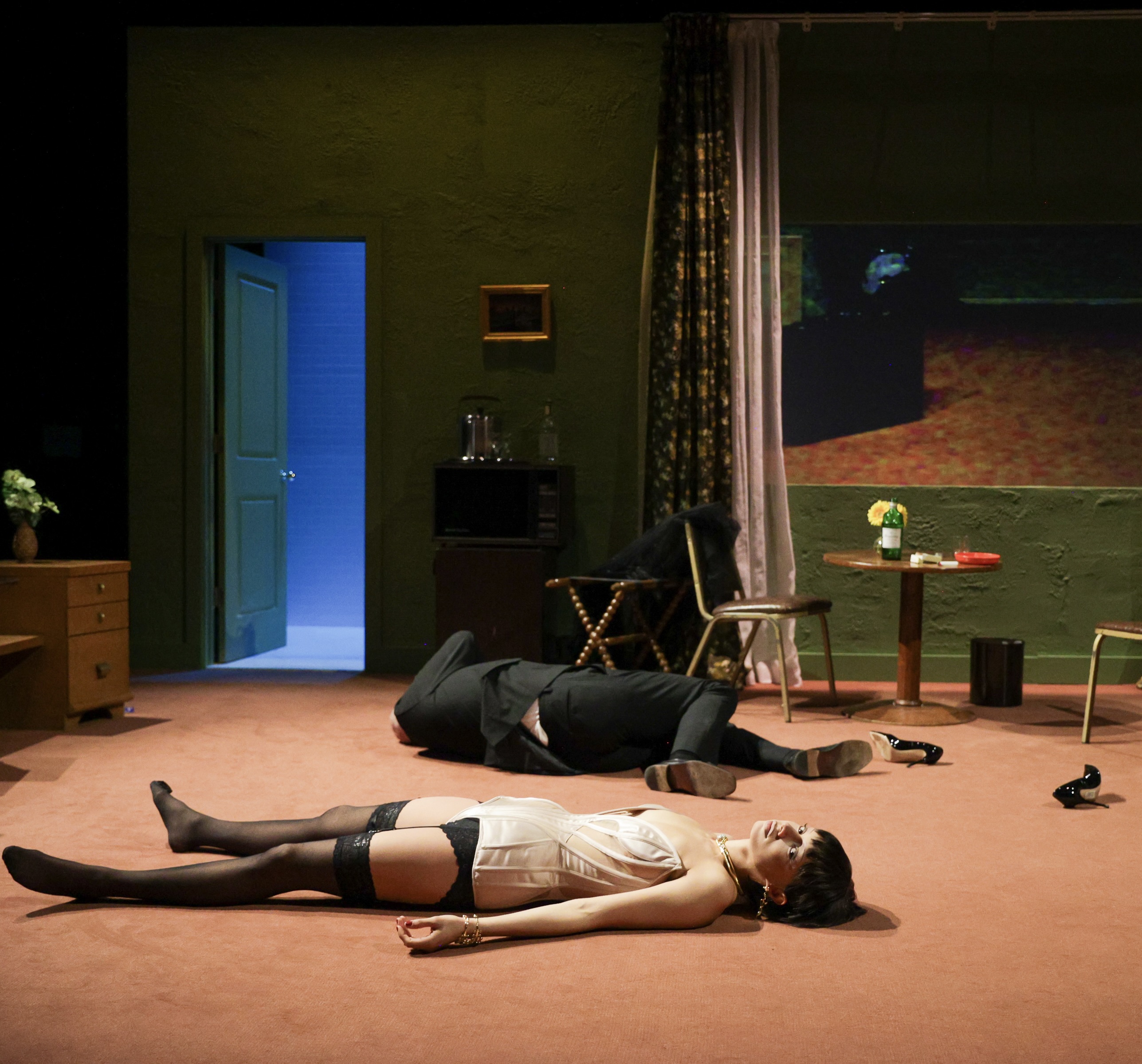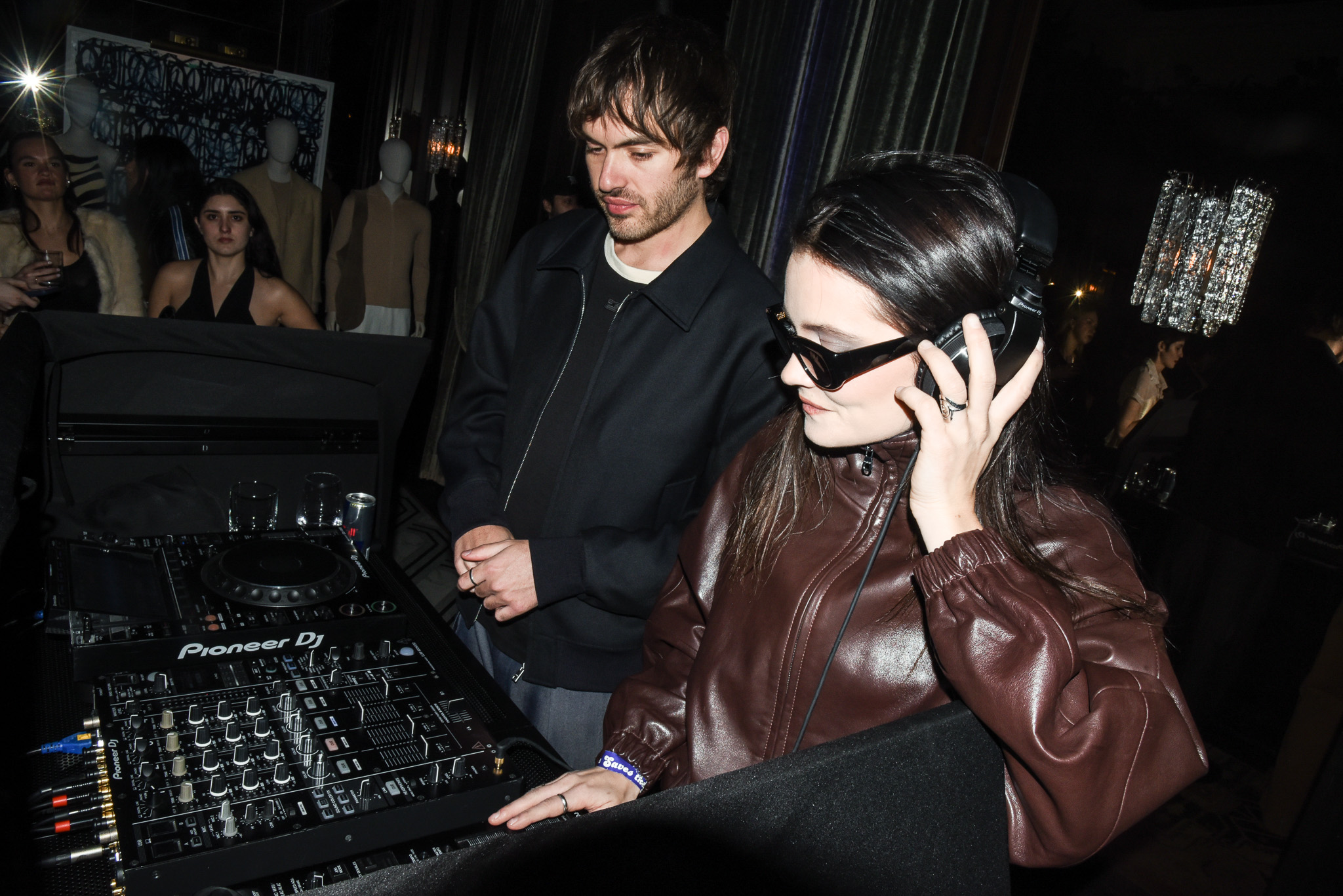

Photograph from “And Then” by Jo Metson Scott and Nicola Yeoman.
[](https://flaunt-mag.squarespace.com/config/pages/587fe9d4d2b857e5d49ca782#)[](https://flaunt-mag.squarespace.com/config/pages/587fe9d4d2b857e5d49ca782#)
Unlisted
¯\_(ツ)\_/¯
The etymology of the
_rōnin_
illustrates a wandering man, without home or master. Though, true historical
_rōnin_
of the Japanese feudal period sought closeness through violent ends, banding together to exuberantly rape and pillage villages. Fictional depictions of the “wave men” in the Edo period yield closer to modern truth: they sell umbrellas, seek favor in a population disinterested in their services, pander in their isolation. Solidarity has long been romanticized. John Keats‛ reference to “nature’s patient, sleepless Eremite,” illustrates a warm solitude; even in the cold dark universe, Keats is stealing a tender moment with a lover. And while the word Eremite is a common term for a religious recluse—never truly alone in their faith in God—it stems from the Greek adjective
_eremos_
, which more bleakly points to emptiness and desolation. Object Lesson: Much is made of J.D. Salinger’s disappearance, literary saps imagining their generation’s sad-eyed angel-headed hipster alone and desolate, in a cabin somewhere “missing everybody.” And yet allegedly, Salinger was a reclusive pedophile holed up in a shack, playing Humbert pen pal to hoards of teenage girls.
The following is a brief survey of those who go unlisted, that—at once—exist in culture but are not seen.
Let’s go back to 12th century Japan; the samurai are kicking ass. They’re the 1990s Chicago Bulls, just destroying everyone in their path—but imagine this: Jordan is also president and governor and Pippen is running the military. And they’re dicks. You’re Japanese author Kamo no Chōmei, born in Kyoto, Japan around 1153 or 1155. You’re the son of a respected _sho-negi—_or superintendent of a sanctuary complex known as the Lower Kamo shrine, (a shrine that still rests on the banks of Japan’s Kamo River today). You’re living the leisurely life; pops is taking care of everything else. You’re studying poetry and music amongst all this political turbulence, massive earthquakes, and famines. You’re thinking you’ll go into the priesthood, but shit, dad kicks the bucket, leaving you to completely immerse yourself in poetry, music, and literature. Despite the loss, you’re creating a name for yourself; things are looking up. You get a job writing poetry at the official Poetry Office, and you’re jamming along, maybe think it’s time for that high priesthood life. However, the Retired Emperor (that rat bastard) chooses his own son over you for the priesthood spot at your dad’s old Kamo Shrine. You’re crushed. Fuck it. Leave the damn Poetry Office and opt for complete reclusion, take vows as a Buddhist. Turn your back on everybody. Start scribbling poetic tomes about your “Ten-Foot-Square Hut.”
Syd Barrett was one brilliant bastard. Under his distorted pilotage Pink Floyd recorded their first LP, _Piper at the Gates of Dawn_, a sinuous progenitor of space rock and a seminal psychedelic offering. But the guy loved to get lit. Dropping LSD god-knows-how-many-times unlocked a malignant spirit within the lad. And while it might have elevated his mind’s eye, his creeping mental instability and erratic behavior eventually ousted him from the group. This is of course before they went on to be one of the most successful bands ever created. He slowly departed from his previous genius and after another decade of scant musical appearances and increasing disassociation with reality, he disappeared altogether. Moved in with his mum in Cambridge and began gardening and painting. Was Barrett’s reasoning to escape to save himself from society or to save society from himself? There aren’t many answers; he was caged from the world until his death in 2006.
Fortunately not all recluses, disavow regular life into obscurity with the onset of mental illness, some have solitude innate in their being. The hippie movement is as entrenched in American culture as Hollywood celebrity and serial killing. Sure the lames were taking it seriously by the late ’60s but guess what? eden ahbez (purposefully lowercased by his choice) was living _la vita semplice_ during the war-torn ’40s, son. Bearded, barefoot, white-robed, vegetarian—the man was creating an archetype just by living the way he wanted. abhez’s reasoning came by association, he began hanging around a raw food restaurant that followed German philosophies known as _Lebensreform_ and _Naturmensch_, grounded in growing organically, eating raw, and returning to nature \[nudge nudge: every tumblr-fied Venice resident in 2014\]. He rode a bike; he studied yoga, and chose this life of bucolic simplicity. ahbez was a trained musician, and even wrote a song for Nat King Cole, which became a hit, the aptly-titled “Nature Boy.” The only perplexing angle in abhez’s choice of lifestyle was the spot he set up camp; under the first ‘L’ of the Hollywood sign in mid-century Los Angeles, California.
_“Les vrais paradis sont les paradis qu’on a perdus._”; “True paradises are the paradises we have lost.”
Marcel Proust—the French novelist of _In Search of Lost Time_—lived in relative isolation the last 17 years of his life. When it comes to Proust, it comes with some heaviness. \[_Editor’s note_: Bear in mind, circa 1900, everyone and their pet cat were blitzed off their gourds all day on liquid cocaine, morphine, and alcohol, even for just a simple cough—and Proust was no stranger to these tonics.\] There is a laundry list of reasons why the prolific writer might have chosen to live out of sight:
a.) The death of his parents in 1903 and 1905. b.) His brother’s marriage and subsequent departure from the family home. c.) His declining health. d.) His closeted homosexuality.
He built a room lined with cork to eliminate outside sound interference and even installed layers of curtains to keep sunlight from seeping in through the windows. In the final three years of Proust’s life he lived in total reclusion, rarely leaving his house or speaking with anyone.
And then some give no reasoning at all for their extroversion, and somehow—even with the added variable of fandom—they maintain their much beloved privacy. Until 2004 there were only a handful of photos of Texas specter, Jandek, and most adorned the covers of his countless albums (over 70 at last count). His contributions to music have been from afar—gifts in the form of LPs released on his own label, Corwood Industries. Long-form and atonal, his music gallops between monochord drone and East Texas folk and blues traditions. When one says nothing is known about Jandek’s past, his life story, it’s concrete barring one detail; there is an anecdote told of the man penning seven novels all rejected by New York publishers, and subsequently burning the lot. Given this; let it be known Jandek’s following is cultic and fierce—and strangely enough—not the least of which reside in Ivy League institutions. Jandek debuted himself on October 17, 2004 at Glasgow in Scotland’s Instal festival, and in the past 10 years has shown his face in public a few more times, enabling the errant photo of the musician on stage.
Chess master Bobby Fischer disappeared from the limelight after many successful years, but unfortunately he was also an anti-Semite.
 
Photograph from “And Then” by Jo Metson Scott and Nicola Yeoman.
[](https://flaunt-mag.squarespace.com/config/pages/587fe9d4d2b857e5d49ca782#)[](https://flaunt-mag.squarespace.com/config/pages/587fe9d4d2b857e5d49ca782#)
Unlisted
¯\_(ツ)\_/¯
The etymology of the
_rōnin_
illustrates a wandering man, without home or master. Though, true historical
_rōnin_
of the Japanese feudal period sought closeness through violent ends, banding together to exuberantly rape and pillage villages. Fictional depictions of the “wave men” in the Edo period yield closer to modern truth: they sell umbrellas, seek favor in a population disinterested in their services, pander in their isolation. Solidarity has long been romanticized. John Keats‛ reference to “nature’s patient, sleepless Eremite,” illustrates a warm solitude; even in the cold dark universe, Keats is stealing a tender moment with a lover. And while the word Eremite is a common term for a religious recluse—never truly alone in their faith in God—it stems from the Greek adjective
_eremos_
, which more bleakly points to emptiness and desolation. Object Lesson: Much is made of J.D. Salinger’s disappearance, literary saps imagining their generation’s sad-eyed angel-headed hipster alone and desolate, in a cabin somewhere “missing everybody.” And yet allegedly, Salinger was a reclusive pedophile holed up in a shack, playing Humbert pen pal to hoards of teenage girls.
The following is a brief survey of those who go unlisted, that—at once—exist in culture but are not seen.
Let’s go back to 12th century Japan; the samurai are kicking ass. They’re the 1990s Chicago Bulls, just destroying everyone in their path—but imagine this: Jordan is also president and governor and Pippen is running the military. And they’re dicks. You’re Japanese author Kamo no Chōmei, born in Kyoto, Japan around 1153 or 1155. You’re the son of a respected _sho-negi—_or superintendent of a sanctuary complex known as the Lower Kamo shrine, (a shrine that still rests on the banks of Japan’s Kamo River today). You’re living the leisurely life; pops is taking care of everything else. You’re studying poetry and music amongst all this political turbulence, massive earthquakes, and famines. You’re thinking you’ll go into the priesthood, but shit, dad kicks the bucket, leaving you to completely immerse yourself in poetry, music, and literature. Despite the loss, you’re creating a name for yourself; things are looking up. You get a job writing poetry at the official Poetry Office, and you’re jamming along, maybe think it’s time for that high priesthood life. However, the Retired Emperor (that rat bastard) chooses his own son over you for the priesthood spot at your dad’s old Kamo Shrine. You’re crushed. Fuck it. Leave the damn Poetry Office and opt for complete reclusion, take vows as a Buddhist. Turn your back on everybody. Start scribbling poetic tomes about your “Ten-Foot-Square Hut.”
Syd Barrett was one brilliant bastard. Under his distorted pilotage Pink Floyd recorded their first LP, _Piper at the Gates of Dawn_, a sinuous progenitor of space rock and a seminal psychedelic offering. But the guy loved to get lit. Dropping LSD god-knows-how-many-times unlocked a malignant spirit within the lad. And while it might have elevated his mind’s eye, his creeping mental instability and erratic behavior eventually ousted him from the group. This is of course before they went on to be one of the most successful bands ever created. He slowly departed from his previous genius and after another decade of scant musical appearances and increasing disassociation with reality, he disappeared altogether. Moved in with his mum in Cambridge and began gardening and painting. Was Barrett’s reasoning to escape to save himself from society or to save society from himself? There aren’t many answers; he was caged from the world until his death in 2006.
Fortunately not all recluses, disavow regular life into obscurity with the onset of mental illness, some have solitude innate in their being. The hippie movement is as entrenched in American culture as Hollywood celebrity and serial killing. Sure the lames were taking it seriously by the late ’60s but guess what? eden ahbez (purposefully lowercased by his choice) was living _la vita semplice_ during the war-torn ’40s, son. Bearded, barefoot, white-robed, vegetarian—the man was creating an archetype just by living the way he wanted. abhez’s reasoning came by association, he began hanging around a raw food restaurant that followed German philosophies known as _Lebensreform_ and _Naturmensch_, grounded in growing organically, eating raw, and returning to nature \[nudge nudge: every tumblr-fied Venice resident in 2014\]. He rode a bike; he studied yoga, and chose this life of bucolic simplicity. ahbez was a trained musician, and even wrote a song for Nat King Cole, which became a hit, the aptly-titled “Nature Boy.” The only perplexing angle in abhez’s choice of lifestyle was the spot he set up camp; under the first ‘L’ of the Hollywood sign in mid-century Los Angeles, California.
_“Les vrais paradis sont les paradis qu’on a perdus._”; “True paradises are the paradises we have lost.”
Marcel Proust—the French novelist of _In Search of Lost Time_—lived in relative isolation the last 17 years of his life. When it comes to Proust, it comes with some heaviness. \[_Editor’s note_: Bear in mind, circa 1900, everyone and their pet cat were blitzed off their gourds all day on liquid cocaine, morphine, and alcohol, even for just a simple cough—and Proust was no stranger to these tonics.\] There is a laundry list of reasons why the prolific writer might have chosen to live out of sight:
a.) The death of his parents in 1903 and 1905. b.) His brother’s marriage and subsequent departure from the family home. c.) His declining health. d.) His closeted homosexuality.
He built a room lined with cork to eliminate outside sound interference and even installed layers of curtains to keep sunlight from seeping in through the windows. In the final three years of Proust’s life he lived in total reclusion, rarely leaving his house or speaking with anyone.
And then some give no reasoning at all for their extroversion, and somehow—even with the added variable of fandom—they maintain their much beloved privacy. Until 2004 there were only a handful of photos of Texas specter, Jandek, and most adorned the covers of his countless albums (over 70 at last count). His contributions to music have been from afar—gifts in the form of LPs released on his own label, Corwood Industries. Long-form and atonal, his music gallops between monochord drone and East Texas folk and blues traditions. When one says nothing is known about Jandek’s past, his life story, it’s concrete barring one detail; there is an anecdote told of the man penning seven novels all rejected by New York publishers, and subsequently burning the lot. Given this; let it be known Jandek’s following is cultic and fierce—and strangely enough—not the least of which reside in Ivy League institutions. Jandek debuted himself on October 17, 2004 at Glasgow in Scotland’s Instal festival, and in the past 10 years has shown his face in public a few more times, enabling the errant photo of the musician on stage.
Chess master Bobby Fischer disappeared from the limelight after many successful years, but unfortunately he was also an anti-Semite.

Photograph from “And Then” by Jo Metson Scott and Nicola Yeoman.
[](https://flaunt-mag.squarespace.com/config/pages/587fe9d4d2b857e5d49ca782#)[](https://flaunt-mag.squarespace.com/config/pages/587fe9d4d2b857e5d49ca782#)
Unlisted
¯\_(ツ)\_/¯
The etymology of the
_rōnin_
illustrates a wandering man, without home or master. Though, true historical
_rōnin_
of the Japanese feudal period sought closeness through violent ends, banding together to exuberantly rape and pillage villages. Fictional depictions of the “wave men” in the Edo period yield closer to modern truth: they sell umbrellas, seek favor in a population disinterested in their services, pander in their isolation. Solidarity has long been romanticized. John Keats‛ reference to “nature’s patient, sleepless Eremite,” illustrates a warm solitude; even in the cold dark universe, Keats is stealing a tender moment with a lover. And while the word Eremite is a common term for a religious recluse—never truly alone in their faith in God—it stems from the Greek adjective
_eremos_
, which more bleakly points to emptiness and desolation. Object Lesson: Much is made of J.D. Salinger’s disappearance, literary saps imagining their generation’s sad-eyed angel-headed hipster alone and desolate, in a cabin somewhere “missing everybody.” And yet allegedly, Salinger was a reclusive pedophile holed up in a shack, playing Humbert pen pal to hoards of teenage girls.
The following is a brief survey of those who go unlisted, that—at once—exist in culture but are not seen.
Let’s go back to 12th century Japan; the samurai are kicking ass. They’re the 1990s Chicago Bulls, just destroying everyone in their path—but imagine this: Jordan is also president and governor and Pippen is running the military. And they’re dicks. You’re Japanese author Kamo no Chōmei, born in Kyoto, Japan around 1153 or 1155. You’re the son of a respected _sho-negi—_or superintendent of a sanctuary complex known as the Lower Kamo shrine, (a shrine that still rests on the banks of Japan’s Kamo River today). You’re living the leisurely life; pops is taking care of everything else. You’re studying poetry and music amongst all this political turbulence, massive earthquakes, and famines. You’re thinking you’ll go into the priesthood, but shit, dad kicks the bucket, leaving you to completely immerse yourself in poetry, music, and literature. Despite the loss, you’re creating a name for yourself; things are looking up. You get a job writing poetry at the official Poetry Office, and you’re jamming along, maybe think it’s time for that high priesthood life. However, the Retired Emperor (that rat bastard) chooses his own son over you for the priesthood spot at your dad’s old Kamo Shrine. You’re crushed. Fuck it. Leave the damn Poetry Office and opt for complete reclusion, take vows as a Buddhist. Turn your back on everybody. Start scribbling poetic tomes about your “Ten-Foot-Square Hut.”
Syd Barrett was one brilliant bastard. Under his distorted pilotage Pink Floyd recorded their first LP, _Piper at the Gates of Dawn_, a sinuous progenitor of space rock and a seminal psychedelic offering. But the guy loved to get lit. Dropping LSD god-knows-how-many-times unlocked a malignant spirit within the lad. And while it might have elevated his mind’s eye, his creeping mental instability and erratic behavior eventually ousted him from the group. This is of course before they went on to be one of the most successful bands ever created. He slowly departed from his previous genius and after another decade of scant musical appearances and increasing disassociation with reality, he disappeared altogether. Moved in with his mum in Cambridge and began gardening and painting. Was Barrett’s reasoning to escape to save himself from society or to save society from himself? There aren’t many answers; he was caged from the world until his death in 2006.
Fortunately not all recluses, disavow regular life into obscurity with the onset of mental illness, some have solitude innate in their being. The hippie movement is as entrenched in American culture as Hollywood celebrity and serial killing. Sure the lames were taking it seriously by the late ’60s but guess what? eden ahbez (purposefully lowercased by his choice) was living _la vita semplice_ during the war-torn ’40s, son. Bearded, barefoot, white-robed, vegetarian—the man was creating an archetype just by living the way he wanted. abhez’s reasoning came by association, he began hanging around a raw food restaurant that followed German philosophies known as _Lebensreform_ and _Naturmensch_, grounded in growing organically, eating raw, and returning to nature \[nudge nudge: every tumblr-fied Venice resident in 2014\]. He rode a bike; he studied yoga, and chose this life of bucolic simplicity. ahbez was a trained musician, and even wrote a song for Nat King Cole, which became a hit, the aptly-titled “Nature Boy.” The only perplexing angle in abhez’s choice of lifestyle was the spot he set up camp; under the first ‘L’ of the Hollywood sign in mid-century Los Angeles, California.
_“Les vrais paradis sont les paradis qu’on a perdus._”; “True paradises are the paradises we have lost.”
Marcel Proust—the French novelist of _In Search of Lost Time_—lived in relative isolation the last 17 years of his life. When it comes to Proust, it comes with some heaviness. \[_Editor’s note_: Bear in mind, circa 1900, everyone and their pet cat were blitzed off their gourds all day on liquid cocaine, morphine, and alcohol, even for just a simple cough—and Proust was no stranger to these tonics.\] There is a laundry list of reasons why the prolific writer might have chosen to live out of sight:
a.) The death of his parents in 1903 and 1905. b.) His brother’s marriage and subsequent departure from the family home. c.) His declining health. d.) His closeted homosexuality.
He built a room lined with cork to eliminate outside sound interference and even installed layers of curtains to keep sunlight from seeping in through the windows. In the final three years of Proust’s life he lived in total reclusion, rarely leaving his house or speaking with anyone.
And then some give no reasoning at all for their extroversion, and somehow—even with the added variable of fandom—they maintain their much beloved privacy. Until 2004 there were only a handful of photos of Texas specter, Jandek, and most adorned the covers of his countless albums (over 70 at last count). His contributions to music have been from afar—gifts in the form of LPs released on his own label, Corwood Industries. Long-form and atonal, his music gallops between monochord drone and East Texas folk and blues traditions. When one says nothing is known about Jandek’s past, his life story, it’s concrete barring one detail; there is an anecdote told of the man penning seven novels all rejected by New York publishers, and subsequently burning the lot. Given this; let it be known Jandek’s following is cultic and fierce—and strangely enough—not the least of which reside in Ivy League institutions. Jandek debuted himself on October 17, 2004 at Glasgow in Scotland’s Instal festival, and in the past 10 years has shown his face in public a few more times, enabling the errant photo of the musician on stage.
Chess master Bobby Fischer disappeared from the limelight after many successful years, but unfortunately he was also an anti-Semite.





.jpg)












